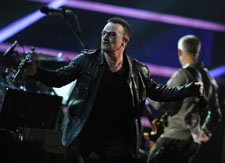
A few years ago, while on tour in Europe, I had the opportunity to visit a number of renowned cathedrals.
Many took centuries to build, with generations of artisans spending their entire lives crafting every nook and cranny.
Repeatedly, I was struck with conflicting feelings; these magnificent structures were awe-inspiring; dedicated to the glory of God; the miracles that occurred within the walls too abundant to comprehend.
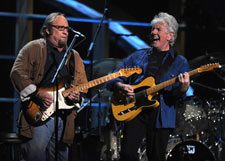
At the same time, it was impossible to ignore the negative connotations; the vainglorious, darker side of church history, one rife with greed and corruption.
That same sense of contradiction surfaced while watching the Concert for the Rock And Roll Hall of Fame recently.
The music that set a generation free has been twisted and manipulated to the point it’s hardly recognizable at times. By it’s very nature, rock ‘n’ roll is confrontational – breaking rules and thumbing it’s nose at convention.

The whole notion of honouring such a rebellious art form reeks of industry politics. Putting a tuxedo on the practitioners just doesn’t make sense.
Yet there they were; elder statesmen and women of rock, plugged in and parading across the hallowed stage of Madison Square Garden. Sadly, the majority came across like oldies acts – extremely talented oldies acts, mind you, but hardly life-changing.
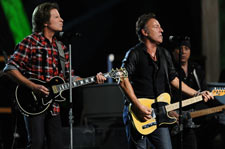
As a relatively junior member of the Baby Boomer generation, I was lucky enough to experience the golden age of rock while it was still happening, and long before it had become respectable.
The rare occasion when a band actually made it to television – usually The Ed Sullivan Show, sandwiched between vaudeville acts, jugglers and dancing chimps – was like manna from heaven.
When it came to music, TV was geared towards the older set, with middle-aged pop singers and big band vets like Benny Goodman and Count Basie showing up week after week. Next to the Beatles, Stones and Byrds, they seemed embarrassingly quaint and hopelessly out of touch.
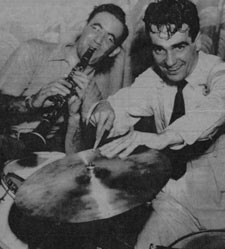
Eventually, I realized that I was the one who was small-minded. Goodman’s famed Carnegie Hall Concert of 1938, for instance –with Gene Krupa, Lionel Hampton and the rest – sparked a fire hard to equal in any genre.
But it took years – and most importantly – a return to the source, for me to understand what all the fuss had been about.
Anyone born after rock came of age might well question why any of this matters. Few performers featured on the Hall Of Fame concert come across like the vibrant scene shakers they once were, and many – having survived legendary tales of excess – have not aged gracefully.
That’s not to say that the show was a disaster – not by a long shot. There were numerous highs to offset the lows. And let’s be clear: when discussing music, it’s entirely subjective; the same performance can have a decidedly different effect on individual listeners.
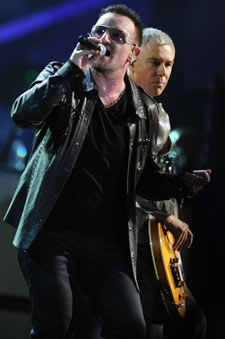
Bono addressed the enigma directly; “Here in rock ‘n roll’s great cathedral that is Madison Square Garden, thinking in this moment about all the pilgrims, all the pioneers that got us all here. The saints and the heretics, the poets and the punks, that now make up the Hall of Fame.
“It’s a dangerous thing, this business of building idols, but at least rock ‘n’ roll is not – at it’s best – about worshipping sacred cows. It’s about the thousands of voices gathered in one great, unwashed congregation; like tonight. For a lot of us here, rock ‘n’ roll just means one word: liberation. Political, sexual, spiritual; liberation.”
Music industry pundit Bob Lefsetz weighed in on U2’s portion of the show in his influential Lefsetz Letter: “And then Bono starts to sing like he means it. They’re his words, not the rhymes of some hack in a back room. He was feeling it, and as a result we felt it too.
“Everything I thought I knew was wrong. Not only soft music could work on TV, U2 was killing it! Unlike what had come before, this was not nostalgia, but alive and kicking. This was rock and roll!”
The band’s truncated set was, typically, made up of songs of faith, including ‘Magnificent,’ from their latest album. The song, which speaks directly to the Christian experience, was singled out by Lefsetz, who does not share the band’s faith.
“…I couldn’t speak. My eyes were glued to the tube. I remembered what made me a believer. From there it was downhill…But it’s "Magnificent" that stuck with me. Because it encapsulated exactly Bono’s description of rock and roll. Liberation!”
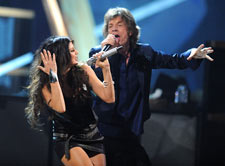
That was hardly but the case when the band brought on Mick Jagger and Black Eyed Peas’ Fergie for a perfunctory take on ‘Gimme Shelter.’ At it’s best, rock ‘n’ roll takes risks and challenges the status quo. This was the polar opposite. Any danger inherent in song was long gone, as Jagger – without the rest of the Stones – came across almost cartoonish, and Fergie (covering Merry Clayton’s memorable vocal part) offering a serviceable if shallow reading that exuded a generic, cookie-cutter sexuality. It was one of many points during the evening where the spirit appeared forced.
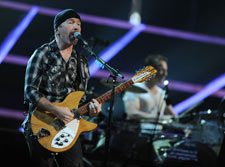
In U2’s 2005 acceptance speech into the Hall of Fame, The Edge alluded to that elusive spirit; “In spite of all the clichés – which do exist – rock ‘n’ roll, when it is great, it is amazing. It changes your life. It changed our lives…
“You can break it down, you can study it all you want, but you cannot just dial it up. It doesn’t work like that. And as far as U2 goes, I’ve stopped trying to figure out how, or more importantly, when our best moments are going to come along, but I think that’s why we’re still awake, and that’s why we’re still paying attention, and we know in the end, we know that it is magic”
© John Cody 2010
